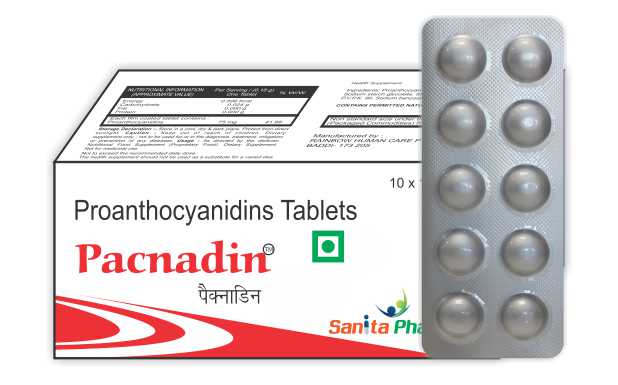Proanthocyanidins (also called leukoanthocyanidins) are a class of natural polyphenolic
bioflavonoids that are very widespread in nature. Proanthocyanidins appear to be especially
effective in neutralizing highly reactive hydroxyl and singlet oxygen radicals. Both of these
reactive oxygen species are involved in inflammatory processes.
Proanthocyanidins also support and enhance the activity of vitamin C, and are known for their ability to help support the health of the body's capillary system and connective tissues. Proanthocyanidins have been shown to bind with collagen fibers, thereby protecting them from premature degradation. This helps maintain the natural elasticity of collagen in skin, joints, arteries, capillaries, and other connective tissues.
This supplement helps support cardiac health by maintaining youthful endothelial
function, regulating platelet aggregation, and reducing inflammation. It is a powerful protector of
heart and general circulation. It favorably changes a number of metabolic signals toward
reduced risk for cardiovascular disease. It is proven to act as a water-soluble antioxidant and
helps lower key inflammatory signals such as CRP, IL6, and TNFa. It is also proven to act at the
gene transcription level, helping clear cholesterol, reduce triglycerides, and directly helping the
key inflammatory gene signal known as NF-kappaB.
Indications:The main used of Proanthocyanidine are:
Chronic Venous Insufficiency: Proanthocyanidins have been shown to strengthen capillaries in double-
blind research.
Capillary Fragility: Proanthocyanidins extracted from grape seeds have been shown to increase capillary strength in people with hypertension and diabetes.
Retinopathy: Found in pine bark, grape seed, and other plant sources, proanthocyanidins may help slow the progression of diabetic retinopathy.
Sunburn: These flavonoids may increase the amount of ultraviolet rays necessary to cause sunburn.
Hypertension: grape seed extract may lower blood pressure in people with mildly elevated blood
pressure.
Pancreatic Insufficiency: grape seed extract saw reduced frequency and intensity of abdominal pain.
Other benefits are:
- Encourages wounds to heal
- Supports normal lipid profiles, likely due to the presence of naringin
- Excellent remedy for toenail fungus
- Effective, natural preservative for cosmetics
- Encourages heart health
- Helps alkalize the body
- Improving night vision
- Protecting collagen and elastin in your skin (for anti-aging effects)
- Treating hemorrhoids
- Protecting against oxidative rancidity and bacterial pathogens
- Alzheimer disease
- Diabetes (improving blood sugar control)
About Composition: Proanthocyanidin is an industrial derivative of grape seeds, extremely rich in antioxidants and oligomeric proanthocyanidin complexes (OPCs). The extract has been linked to a wide range of possible therapeutic properties including healing wounds and treating conditions such as high cholesterol, atherosclerosis, macular degeneration, poor circulation and nerve damage. Proanthocyanidins are highly regarded for their strong antioxidant properties, and for their functions in supporting the body's connective tissues and capillary blood vessel system.
Side Effects:
The product is POSSIBLY SAFE for most adults when taken by mouth. There is no disadvantage associated with the product. if taken under the recommended usage.
Special Precautions & Warnings:
Pregnancy and Breast-Feeding: Pregnant and lactating mothers should not take any single supplement in higher-than-normal doses unless recommended by a health-care provider for a special condition. The combination should only be used in pregnancy and lactation if benefits outweigh the risks. Stay on the safe side and avoid use.
Storage:
Store in a cool, dry & dark place. Protected from direct sunlight.
